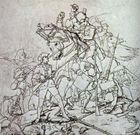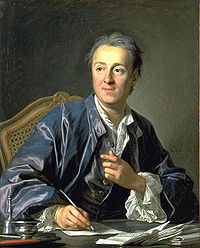1780
| Millennium: | 2nd millennium |
|---|---|
| Centuries: | 17th century – 18th century – 19th century |
| Decades: | 1750s 1760s 1770s – 1780s – 1790s 1800s 1810s |
| Years: | 1777 1778 1779 – 1780 – 1781 1782 1783 |
| 1780 in topic: |
| Subjects: Archaeology – Architecture – |
| Art – Literature (Poetry) – Music – Science |
| Countries: |
| Leaders: State leaders – Colonial governors |
| Category: Establishments – Disestablishments |
| Births – Deaths – Works |
Year 1780 (MDCCLXXX) was a leap year starting on Saturday (link will display the full calendar) of the Gregorian calendar (or a leap year starting on Wednesday of the 11-day slower Julian calendar).
Contents |
Events of 1780
January–June
- January 16 – American Revolutionary War – Battle of Cape St. Vincent: British Admiral Sir George Rodney defeats a Spanish fleet.
- February – The League of Armed Neutrality is formed between Denmark, Sweden, and Russia.
- February 29 – The Omicron Delta Omega co-ed fraternity is founded by Benjamin Franklin.
- March 8 – Formation of the League of Armed Neutrality.
- March 26 – The British Gazette and Sunday Monitor, the first Sunday newspaper in Britain, begins publication.
- April 16 – The University of Münster in Münster, North Rhine-Westphalia, Germany is founded.
- May 12 – American Revolutionary War: Charleston, South Carolina is taken by British forces.

May 29: Waxhaw Massacre in America.
- May 13 – Cumberland Compact signed by American settlers in the Cumberland Valley of Tennessee.
- May 19 – New England's Dark Day: An unaccountable darkness spreads over New England, regarded by some observers as a fulfillment of Bible prophecy.
- May 29 – American Revolutionary War: Loyalist forces under Col. Banastre Tarleton kill surrendering American soldiers in the Waxhaw Massacre.
- June 2 – Gordon Riots in London, Great Britain: The Duke of Richmond calls, in the House of Lords, for manhood suffrage and annual parliaments.
July–December
- July 11 – French soldiers arrive in Newport, Rhode Island to reinforce colonists in the American Revolutionary War[1].
- August 16 – American Revolutionary War – Battle of Camden: British troops inflict heavy losses on a Patriot army at Camden, South Carolina.
- 9 August – American Revolutionary War: Spanish admiral Luis de Córdova y Córdova captures a British convoy totalling 55 vessels amongst Indiamen, frigates and other cargo ships off Cape St. Vincent.[2][3]
- August 24 – Louis XVI of France abolishes the use of torture in extracting confessions.
- September 21 – Benedict Arnold gives detailed plans of West Point to Major John André. Three days later, André is captured with papers revealing that Arnold was planning to surrender West Point to the British.
- September 25 – Benedict Arnold flees to British-held New York.
- October 2 – American Revolutionary War: In Tappan, New York, British spy John André is hanged by American forces.
- October 7 – American Revolutionary War – Battle of Kings Mountain: Patriot militia forces annihilate a Loyalists under British Major Patrick Ferguson at Kings Mountain in South Carolina.
- October 10–16 – The Great Hurricane flattens the islands of Barbados, Martinique and St. Eustatius: 22,000 dead.
- November 29 – Maria Theresa of Austria dies and her Habsburg dominions pass to her ambitious son, Joseph II, who has already been Holy Roman Emperor since 1765.
- December 16 – Emperor Kōkaku accedes to the throne of Japan.
- December 20 start of the Fourth Anglo-Dutch War.
Undated

1780: Final volume, Diderot Encyclopédie.
- In Ireland, Lady Berry, who is sentenced to death for the murder of her son, is released when she agrees to become an executioner (retires 1810)
- The original Craven Cottage is built by William Craven, 6th Baron Craven (located on the centre circle of the pitch).
- Jose Gabriel Kunturkanki, businessman and landowner, proclaims himself Inca Tupac Amaru II.
- Nikephoros Theotokis starts introducing Edinoverie, an attempt to integrate the Old Believers into Russia's established church.
- Western countries pay 16,000,000 ounces of silver for Chinese goods.
- c. 9 million population in Britain.
- Det Dramatiske Selskab is founded in Norway.
Ongoing
Births
| Gregorian calendar | 1780 MDCCLXXX |
| Ab urbe condita | 2533 |
| Armenian calendar | 1229 ԹՎ ՌՄԻԹ |
| Bahá'í calendar | -64 – -63 |
| Bengali calendar | 1187 |
| Berber calendar | 2730 |
| Buddhist calendar | 2324 |
| Burmese calendar | 1142 |
| Byzantine calendar | 7288 – 7289 |
| Chinese calendar | 己亥年十一月廿五日 (4416/4476-11-25) — to —
庚子年十二月初六日(4417/4477-12-6) |
| Coptic calendar | 1496 – 1497 |
| Ethiopian calendar | 1772 – 1773 |
| Hebrew calendar | 5540 – 5541 |
| Hindu calendars | |
| - Bikram Samwat | 1836 – 1837 |
| - Shaka Samvat | 1702 – 1703 |
| - Kali Yuga | 4881 – 4882 |
| Holocene calendar | 11780 |
| Iranian calendar | 1158 – 1159 |
| Islamic calendar | 1193 – 1195 |
| Japanese calendar | An'ei 9 (安永9年) |
| Korean calendar | 4113 |
| Thai solar calendar | 2323 |
- February 19 – Richard McCarty, American politician (d. 1844)
- April 29 – Charles Nodier, French author (d. 1844)
- May 21 – Elizabeth Fry, British humanitarian (d. 1845)
- June 1 – Carl von Clausewitz, Prussian military strategist (d. 1831)
- July 5 – François Carlo Antommarchi, French Physician (d. 1838)
- August 29 – Jean Auguste Dominique Ingres, French painter (d. 1867)
- December 26 – Mary Fairfax Somerville, British mathematician (d. 1872)
- date unknown – John Bird Sumner, Archbishop of Canterbury (d. 1862)
Deaths
- February 14 – William Blackstone, English jurist (b. 1723)
- February 17 – Andreas Felix von Oefele, German historian and librarian (b. 1706)
- February 18 – Kristijonas Donelaitis, Lithuanian poet (b. 1714)
- March 26 – Charles I, Duke of Brunswick-Lüneburg (b. 1713)
- May 18 – Charles Hardy, British governor of Newfoundland (b. c. 1714)
- June 3 – Thomas Hutchinson, American colonial governor of Massachusetts (b. 1711)
- July 4 – Prince Charles Alexander of Lorraine, Austrian military leader (b. 1712)
- July 14 – Charles Batteux, French philosopher (b. 1713)
- August 3 – Étienne Bonnot de Condillac, French philosopher (b. 1715)
- August 29 – Jacques-Germain Soufflot, French architect (b. 1713)
- September 4 – John Fielding, English magistrate and social reformer (b. 1721)
- September 8 – Enoch Poor, American Revolutionary general (b. 1736)
- October 2 – John André, British Army officer of the American Revolutionary War (executed) (b. 1750)
- October 17 – William Cookworthy, English chemist (b. 1705)
- November 26 – Sir James Denham Steuart, 4th Baronet, British economist (b. 1712)
- November 29 – Empress Maria Theresa of Austria (b. 1717)
- December 26 – John Fothergill, English physician (b. 1712)
- date unknown – Thomas Dilworth, British cleric and writer
Notes
- ↑ "Timeline of the American Revolutionary War". Independence Hall. http://www.ushistory.org/march/timeline.htm. Retrieved 2007-06-01.
- ↑ Hattendorf, John: Naval policy and strategy in the Mediterranean: past, present, and future. Taylor & Francis, 2000, page 37. ISBN 0714680540
- ↑ Harbron, John: Trafalgar and the Spanish Navy. Conway Maritime Press, 1988, page 84. ISBN 0851774776